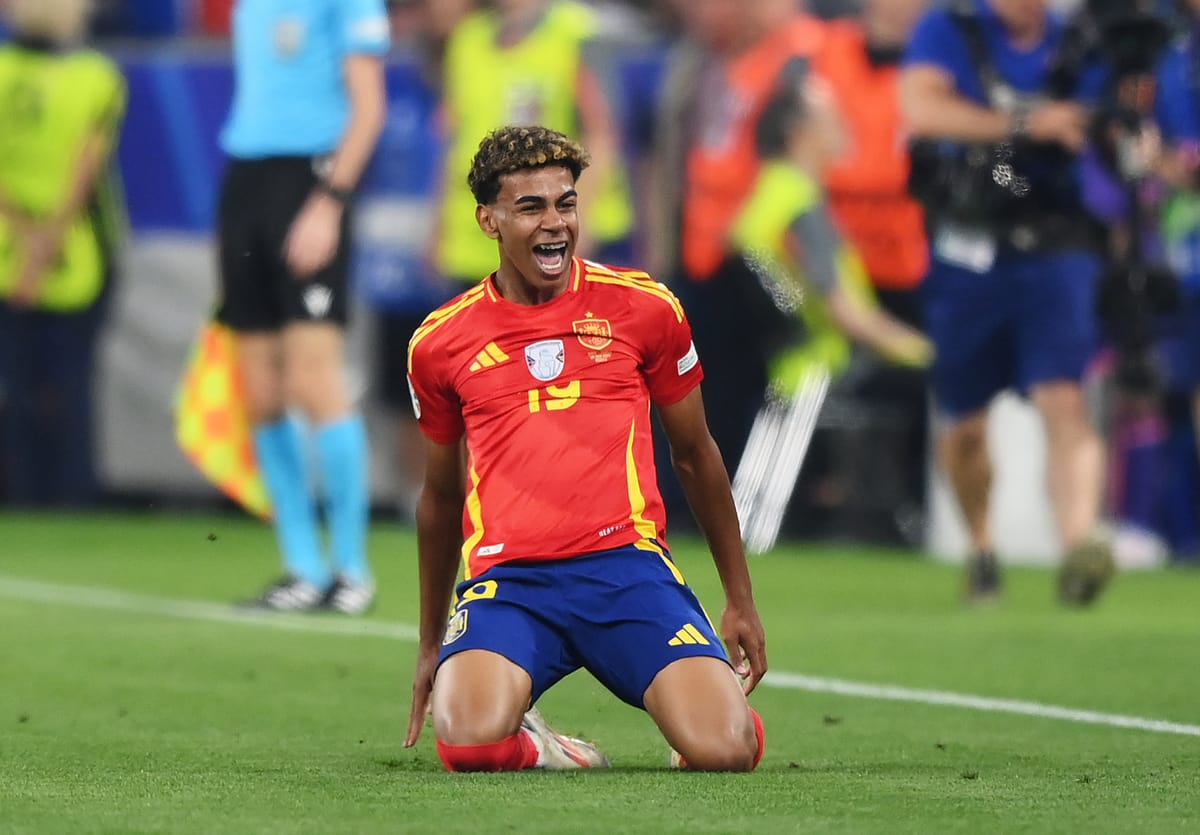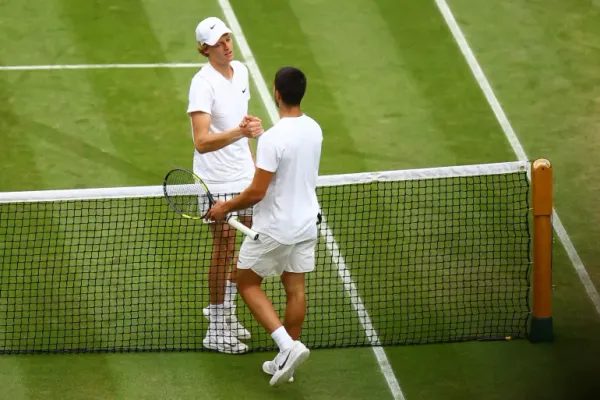Next in Line: Top Wonderkids in World Football (2025)

In every generation, a select few young talents rise above the rest—players who don’t just show promise but demand global attention with performances far beyond their years. In 2025, the footballing world is witnessing a golden crop of prodigies already shaping matches at the highest level. These are not just academy hopefuls or benchwarmers earning a few minutes; they are starters, difference-makers, and in some cases, leaders at the biggest clubs on the planet.
From Lamine Yamal, who is breaking records and weaving through La Liga defenses at just 17, to Warren Zaïre-Emery, already a mainstay in Paris Saint-Germain’s midfield and captaining his team before turning 19—these players are not just the future of football; they’re the present. Whether it's dazzling footwork, tactical intelligence, or calmness under pressure in the Champions League, these six talents are redefining what it means to be a wonderkid.
In the profiles that follow, we explore their recent achievements, statistical impact, and what makes them stand out in a sport full of emerging stars. If you're looking for the next global icons of football—look no further.
1. Lamine Yamal (Barcelona, Spain) – Age 17
Lamine Yamal has had a remarkable season with Barcelona, becoming the youngest player to reach 100 competitive games for the club. In the 2024–25 UEFA Champions League, he played 9 matches, scoring 3 goals and providing 3 assists. His dribbling and creativity have been pivotal in Barcelona's attacking play. UEFA.com
Beyond his Champions League exploits, Yamal's domestic performance has been equally impressive. In La Liga, he contributed significantly to Barcelona's offensive prowess, with 9 goals to his name. His consistent performances have not only solidified his place in the starting lineup but also positioned him as a strong contender for the Ballon d'Or, highlighting his rapid ascent in the footballing world. The Sun, 2025)
2. Désiré Doué (Paris Saint-Germain, France) – Age 19
Doué emerged as a key player for PSG, especially in their Champions League campaign. He scored twice and assisted once in the final against Inter Milan, earning Man of the Match honors. In Ligue 1, he contributed 6 goals and 8 assists in 31 appearances.
Doué's impact was not limited to the Champions League. In the Coupe de France, he added four goals and four assists, including two assists in the final against Reims. His performances earned him the Young Player of the Year award and a spot in the Ligue 1 Team of the Year. Notably, he became the youngest player to score a brace in a Champions League final, surpassing Eusébio's record. Wikipedia
3. Warren Zaïre-Emery (Paris Saint-Germain, France) – Age 18
Zaïre-Emery became the youngest player to reach 100 appearances for PSG. He scored in both Ligue 1 and the Champions League, showcasing his midfield prowess. Notably, he captained PSG on his 19th birthday, highlighting his leadership qualities.
Throughout the season, Zaïre-Emery's consistency in midfield provided stability for PSG. His ability to break up opposition play, and initiate attacks was crucial in PSG's treble-winning campaign. His leadership on and off the pitch has marked him as a future captain for both club and country.
4. Ethan Nwaneri (Arsenal, England) – Age 17
Nwaneri made significant strides with Arsenal, making 37 appearances and scoring 9 goals. His versatility and attacking instincts have made him a valuable asset for the Gunners.
His performances have not gone unnoticed, with Arsenal keen to secure his future amid interest from top European clubs. Discussions for a contract extension are underway, reflecting his importance to Mikel Arteta's plans. Nwaneri's development trajectory suggests he could become a mainstay in Arsenal's midfield for years to come.
5. Endrick (Real Madrid, Brazil) – Age 18
Endrick had a promising start at Real Madrid, scoring 1 goal in 8 Champions League appearances. His pace and finishing ability suggest a bright future ahead.
Despite limited minutes, Endrick's impact was felt whenever he took to the pitch. His high passing accuracy of 76.88% and ability to find space in tight defenses indicate his potential to become a key player for Real Madrid in the coming seasons.
6. Arda Güler (Real Madrid, Turkey) – Age 20
Güler showcased his playmaking skills with a passing accuracy of 89.72% in the Champions League. Though he didn't score, his vision and ball distribution were noteworthy.
In domestic competitions, Güler contributed 1 goal and 1 assist over 20 matches, accumulating 657 minutes of playtime. His ability to control the tempo and distribute the ball efficiently has made him a valuable asset in Real Madrid's midfield rotation.
These young stars are not only shaping the present but also defining the future of football. Their development and performances will be closely watched as they continue to rise on the global stage.
The Others:
While football fans are often captivated by the meteoric rise of household names like Lamine Yamal and Endrick, a quieter revolution is underway. Across Europe and beyond, a new generation of hidden wonderkids is emerging—players who may not yet be global superstars but are already making waves with their raw talent, maturity, and standout performances. These are the prospects still flying under the radar, turning heads in academies, lower-tier leagues, and emerging football markets.
From the tactical intelligence of Pau Cubarsí at Barcelona to the electric dribbling of Leo Sauer in the Dutch Eerste Divisie, these players are writing their own scripts—often in the shadows of better-known teammates. Scouts from elite clubs are already circling, sensing the opportunity to snap up tomorrow’s stars before the rest of the world catches on. What makes these talents even more exciting is their variety: wingers, center-backs, playmakers, and poachers, all bringing something unique to the table.
1. Geovany Quenda (Sporting CP, Portugal) – Age 17
Geovany Quenda is a rising star in Sporting CP's academy, known for his agility and technical skills on the wing. At just 17, he has already made appearances for the first team, showcasing his potential against seasoned professionals. In the UEFA Champions League, he played 10 matches, totaling 722 minutes, and provided 1 assist. His passing accuracy stood at 79.8%, and he completed 22 successful dribbles, indicating his agility and technical prowess on the wing (uefa.com, 2025). His ability to take on defenders and deliver precise crosses has caught the attention of scouts across Europe. Quenda's development is being closely monitored, and he is considered one of the most promising talents in Portuguese football.
2. Leo Sauer (NAC Breda, Netherlands) – Age 19
Slovak winger Leo Sauer has been making waves in the Dutch league with NAC Breda. His speed and dribbling skills have made him a constant threat on the flanks. In the 2024–25 season, Sauer contributed significantly to his team's attacking play, earning praise for his creativity and work rate. His performances have not gone unnoticed, with several top-tier clubs expressing interest in the young talent.Flashscore
3. Eli Junior Kroupi (FC Lorient, France) – Age 18
Eli Junior Kroupi has emerged as a promising forward for FC Lorient. Making his professional debut at just 16, he became the youngest player in the club's history. Kroupi's pace and finishing ability have been instrumental in Lorient's attacking strategies. In the 2024–25 Ligue 2 season, he made 29 appearances (22 starts), scoring 20 goals and providing 2 assists. His progression through the ranks has been swift, and he is now a regular feature in the first team, with expectations of a bright future ahead.
4. Semih Kılıçsoy (Beşiktaş, Turkey) – Age 18
Semih Kılıçsoy is a dynamic forward for Beşiktaş, known for his goal-scoring prowess and versatility in the attacking third. In the 2024–25 season, he made significant contributions to his team's offensive output, demonstrating maturity beyond his years. He maintained a passing accuracy of 83%, showcasing his goal-scoring prowess and versatility in the attacking third (uefa.com, 2025). Kılıçsoy's ability to find the back of the net and create opportunities for teammates has made him a valuable asset for Beşiktaş and a player to watch in Turkish football.
5. Pau Cubarsí (FC Barcelona, Spain) – Age 18
Pau Cubarsí is a central defender who has been making steady progress through FC Barcelona's youth system. In the UEFA Champions League, he played 13 matches, totaling 981 minutes, and achieved a passing accuracy of 95.24%. His composure on the ball and tactical awareness have earned him opportunities with the senior team (uefa.com, 2025). His composure on the ball and tactical awareness have earned him opportunities with the senior team. Cubarsí's defensive capabilities and ability to initiate plays from the back align with Barcelona's footballing philosophy. As he continues to develop, he is expected to become a mainstay in the club's defensive lineup.
6. Kendry Páez (Independiente del Valle, Ecuador) – Age 17
Kendry Páez is an attacking midfielder who has been turning heads with his performances for Independiente del Valle. His vision and creativity have been pivotal in orchestrating his team's offensive plays. Páez's technical skills and ability to read the game have made him a standout player in the Ecuadorian league. His potential has attracted interest from clubs in Europe, and he is considered one of the brightest prospects in South American football.
The Verdict
The 2024–25 season has illuminated a remarkable generational shift in world football. Players like Lamine Yamal, Désiré Doué, and Warren Zaïre-Emery are no longer prospects—they are protagonists, commanding key roles at elite clubs and in major competitions. Their blend of technical brilliance, tactical maturity, and mental composure at such a young age challenges traditional notions of development and experience in the sport.
Meanwhile, emerging stars such as Ethan Nwaneri and Endrick signal the depth of talent poised to dominate the next decade. These players are not merely filling gaps; they are redefining roles and expectations, bringing dynamism and vision that often belies their years. With each passing match, they carve their names deeper into the global football narrative.
As scouts, fans, and analysts look to the future, these prodigies serve as a reminder that the beautiful game’s next era is already underway. The world isn’t waiting for the next Messi or Ronaldo—it’s already watching the rise of football’s next global icons.





